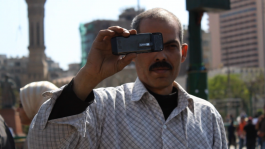2011 Tahrir im April/Tahrir in April

DE Kairo im April 2011 – auf dem Tahrir Platz finden die größten Proteste seit dem Sturz des Regimes im Februar statt. Gerichtsverfahren gegen Mubarak und seine Gefolgsleute werden gefordert und die Absetzung des obersten Armeeführers Tantawi. Gerüchte kursieren – noch ist unklar, ob das Militär die Proteste gewaltsam aufgelöst hat oder ob Schläger unter den Aufständischen verantwortlich sind. Als Mubarak und seine Söhne schließlich festgesetzt werden, räumt das Militär den Platz, um den Protesten ein Ende zu bereiten. Doch auch bei den Aufräumarbeiten und der Wiederbepflanzung des Tahrir gibt es verschiedene Lager, und auf der anderen Straßenseite wird weiter demonstriert. Die Filmemacherin gerät wie zufällig in dieses Szenario. Sie versteht die Sprechchöre, die sie aufzeichnet, nicht und kann die Plakate nicht lesen. Immer wieder geraten die Menschen in Fokus, die das Geschehen mit ihren Handykameras selbst aufnehmen – und sie manchmal zurück richten auf die Filmemacherin.
EN Cairo in April 2011—the biggest demontrations since Mubarak’s resignation in February take place on the central Tahrir Square. Protesters call for the Supreme Council of Armed Forces to be dismissed and demand trials for Mubarak and his entourage. Rumors are spreading about the number of people killed in the recent riots—it is unclear whether the army or thugs among the protesters are responsible for the violence. When Mubarak and his sons are finally put in custody, the army clears the square to put an end to the protests. But even during the clean-up different camps form among the people—some plant flowers in the center of the roundabout while others continue to protest across the street. The filmmaker walks through the scene without understanding the conversations and chants she records. She starts to focus on people who themselves are filming with their cell-phone-cameras and at times they film back at her.
Germany/Egypt, 35 min, HD
Screened at:
Duisburger Filmwoche; DFI-Tagung; Politiken des Dokumentarfilms; Szenografien des Urbanen
2011 Tahrir im April / Tahrir in April

DE Kairo im April 2011 – auf dem Tahrir Platz finden die größten Proteste seit dem Sturz des Regimes im Februar statt. Gerichtsverfahren gegen Mubarak und seine Gefolgsleute werden gefordert und die Absetzung des obersten Armeeführers Tantawi. Gerüchte kursieren – noch ist unklar, ob das Militär die Proteste gewaltsam aufgelöst hat oder ob Schläger unter den Aufständischen verantwortlich sind. Als Mubarak und seine Söhne schließlich festgesetzt werden, räumt das Militär den Platz, um den Protesten ein Ende zu bereiten. Doch auch bei den Aufräumarbeiten und der Wiederbepflanzung des Tahrir gibt es verschiedene Lager, und auf der anderen Straßenseite wird weiter demonstriert. Die Filmemacherin gerät wie zufällig in dieses Szenario. Sie versteht die Sprechchöre, die sie aufzeichnet, nicht und kann die Plakate nicht lesen. Immer wieder geraten die Menschen in Fokus, die das Geschehen mit ihren Handykameras selbst aufnehmen – und sie manchmal zurück richten auf die Filmemacherin.
EN Cairo in April 2011—the biggest demontrations since Mubarak’s resignation in February take place on the central Tahrir Square. Protesters call for the Supreme Council of Armed Forces to be dismissed and demand trials for Mubarak and his entourage. Rumors are spreading about the number of people killed in the recent riots—it is unclear whether the army or thugs among the protesters are responsible for the violence. When Mubarak and his sons are finally put in custody, the army clears the square to put an end to the protests. But even during the clean-up different camps form among the people—some plant flowers in the center of the roundabout while others continue to protest across the street. The filmmaker walks through the scene without understanding the conversations and chants she records. She starts to focus on people who themselves are filming with their cell-phone-cameras and at times they film back at her.
2011, Germany/Egypt, 35 min, HD
Screened at:
Duisburger Filmwoche; DFI-Tagung; Politiken des Dokumentarfilms; Szenografien des Urbanen
X